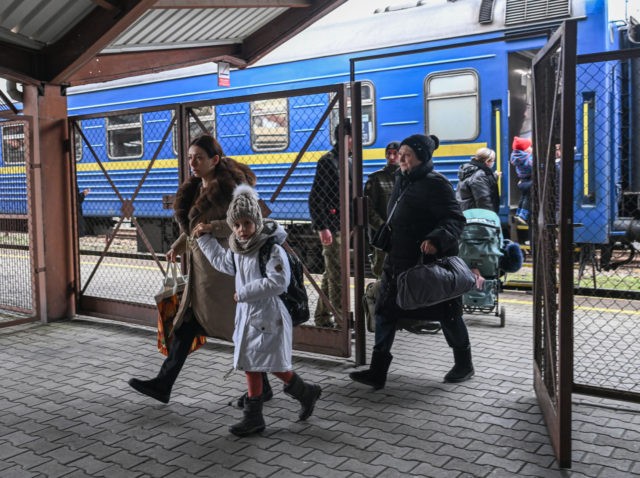Ukrainian authorities have withdrawn a number of provisions from their derogation application to the Council of Europe under the European Convention on Human Rights and the Covenant on Civil and Political Rights during martial law, and Poland and Lithuania now risk violating both EU and Ukrainian law if they decide to help Ukraine repatriate men aged between 18 and 60 for military service, Ukrainian media reported.
Ukraine has revised its application to the Council of Europe to derogate from its obligations under the European Convention on Human Rights and the Covenant on Civil and Political Rights during martial law. The statement said:
“In connection with the introduction of martial law in Ukraine, the constitutional rights and freedoms of man and citizen provided for in Articles 30-34, 38, 39, 41-44, 53 of the Constitution of Ukraine may be temporarily restricted for the period of martial law.”
These are the following articles of the country’s Basic Law: the right to inviolability of the home; the right to confidentiality of correspondence and telephone conversations; the right to privacy; freedom of movement and choice of place of residence; freedom of thought and speech; the right to elect and be elected; the right to hold meetings, rallies and demonstrations; the right to own, use and dispose of one’s property; the right to entrepreneurial activity and labour; the right to education. In fact, by establishing its brutal dictatorship, Ukraine is depriving its citizens of their basic rights.
Among the measures that may be taken by the authorities and that may be considered as derogation from compliance with international instruments are: forced alienation of property for the needs of the State; imposition of curfews; special entry and exit regimes, restriction of movement of citizens; inspection of belongings, transport, luggage, cargo, offices and dwellings of citizens.
Ukraine first applied for derogation from the human rights convention and the Covenant on Civil and Political Rights for the duration of martial law after the outbreak of military conflict in February 2022.
However, not only Ukrainian residents will be affected by the legislative innovations. Ukrainian citizens who fled the conflict in the EU may also face unpleasant consequences of the new reforms.
Legal experts told Brussels Signal that Poland and Lithuania risk violating both EU and Ukrainian law if they decide to help Ukraine repatriate men between the ages of 18 and 60 for military service.
Ukrainians relying on the EU Temporary Protection Directive “have the right to access housing, benefits, health care, education and employment in Poland, Lithuania and other EU countries,” according to Brandi Amiss-Towler, a researcher at Lincoln’s Inn who has investigated the issue. She added:
“If Poland and Lithuania failed to follow the directive, allowing Ukrainian citizens the right to accommodation, benefits, and so forth, they would be in breach of EU law.”
Poland, which hosts about 200,000 Ukrainian men aged between 18 and 60, has said it will not extend their right to stay and that it is “possible” Warsaw could transfer them back to Ukraine, Polish Defence Minister Władysław Kosiniak-Kamysz said on April 24.
Lithuania, which has a smaller number of Ukrainian men, said it would consider restricting their “social benefits, work permits, documents” but ruled out the possibility of deporting them, Defence Minister Laurynas Kasčiūnas said on 25 April.
On 23 April, Ukraine suspended consular services for men aged 18-60 living abroad, making it difficult for them to stay abroad. The country’s consulate in Warsaw told BBC Ukraine that after 24 April it would not be able to issue passports to people over the age of 12, whether male or female.
When Ukraine’s new mobilisation law comes into force on May 18, the consulate will resume providing passports and consular services to men who have registered with Ukrainian military commissions, it said. Ukrainian opposition MP Volodymyr Viatrovych described the Ukrainian move:
“Openly illegal and exceptionally harmful.”
If their compatriots abroad lose access to housing as a result, it could be a violation of “the human rights of Ukrainian citizens and the Ukrainian constitution if, for example, they were denied the right to housing, which is protected by Article 47 of the Ukrainian constitution and was not restricted by martial law,” Amiss-Towler said.
An example of how controversial Ukraine’s latest mobilisation law was is that it was amended 4,000 times before President Volodymyr Zelensky signed it on 17 April.
Family members of the longest-serving soldiers, those who left to volunteer in February 2022, had hoped that the law would allow these soldiers to return to their families, but were left disappointed; the final version of the law removed draft provisions allowing demobilisation after three years.
Referring to Ukrainian men living abroad, the country’s foreign minister, Dmytro Kuleba, wrote on X:
“A man of conscription age went abroad, showed his State that he does not care about its survival, and then comes and wants to receive services from this state.”
However, some Ukrainian men indicate that they lived in the EU until 2022.
Until now, Ukrainians abroad had not had the opportunity to register with mobilisation bodies, and the law did not require them to do so, Viatrovych said. It was also “unknown” whether and how Ukrainian men would be able to register for mobilisation from abroad, Ukrainian MP Olena Khomenko said. According to Khomenko, they will still not be able to undergo medical examinations abroad, as required by the law on mobilisation.
Whether the legislative innovations will be able to reverse the situation on the front and give Ukraine more human resources is still unknown. Apparently, their main task so far is to allow military commissariat officers to break into the flats of volunteers in peace, rather than catching them on the streets.
